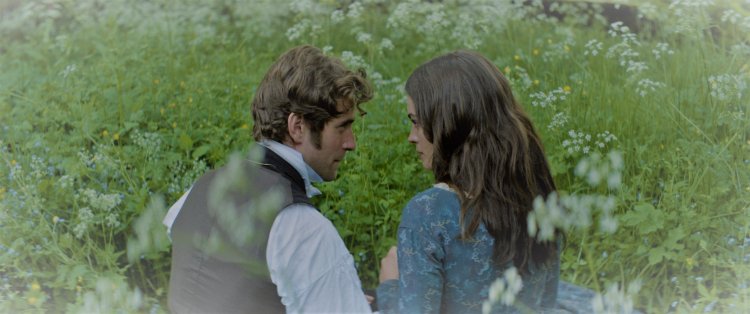Emily

‘How did you write it?’ ‘It’s an ugly book. It’s base and ugly and full of selfish people who only care for themselves,’ accuses a distressed and likely jealous Charlotte Brontë (Alexandra Dowling, HBO's 'Game of Thrones') about her younger sister’s best seller ‘Wuthering Heights.’ Writer/director Frances O'Connor, known for starring in such movies as "Mansfield Park" and "The Conjuring 2," makes a most impressive filmmaking debut sowing the seeds of that novel into the life of the most mysterious of the Brontë sisters, “Emily.”
Laura's Review: A-
O’Connor has always felt a kinship with Emily Brontë and while there are few biographical facts to work with, after visiting Emily’s home in Harwich, the Australian actress spent ten years researching and writing a screenplay which appears to capture the essence of the young woman who wrote with such passion, a rebel bucking against the patriarchal oppression of the day who embraced nature and reveled in the wildness of the Yorkshire moors.
We are introduced to Emily (Emma Mackey, "Death on the Nile") as a conundrum, for her father, Yorkshire clergyman Patrick Brontë (Adrian Dunbar, "The Crying Game"), in particular. While Charlotte, feted over a new teaching position, is the apple of his eye, no one seems to know quite what to do with Emily, whose fear of meeting new people cuts short any attempt to remove her from her rural surroundings to further her education. Emily is closer to her younger sister Anne (Amelia Gething), the two delighting in writing stories about an imaginary land, but Anne withdraws after Charlotte declares the pursuit childish and Emily begins to spend more time with their brother, Branwell (Fionn Whitehead, "Dunkirk," "The Duke"), a kindred spirit if not ideal influence. (Branwell’s obsession with a married woman, Mrs. Linton (Cara Foley), casts him as a major influence on Heathcliff, who married Isabella Linton to spite Catherine, while also illustrating the less refined behavior of the Earnshaws.)
The Brontë household will be thrown into turmoil with the arrival of William Weightman (Oliver Jackson-Cohen, 2020's "The Invisible Man"), a handsome young curate sent to assist the elder Brontë whose first sermon, about finding God in rain, sets the young women’s hearts aflutter. William clearly notices Emily, but first approaches Charlotte and Emily tells her sister she does not trust him, but when her father enlists him to tutor Emily in French, Emily’s continual questioning of his blind faith has William second guessing himself, and, in so doing, intriguing the woman who’s been standing up to him, defiantly brandishing the ‘Freedom in thought!’ sentiment written in script on her forearm (Branwell’s influence again).
O’Connor weaves themes from ‘Wuthering Heights’ into her partially imagined biopic, love’s pain once again resulting from thwarted communication, the supernatural suggested in a séance-like scene in which Emily conjures her mother and in Emily’s contorted view of the landscape after partaking in Branwell’s elixir of opium. She’s also cast her film beautifully, Emma Mackey possessed of a dark and wild beauty which infuses her performance (American audiences may only recognize Gemma Jones, who played "Bridget Jones's" mum, as Aunt Branwell). The production was shot on location in West Yorkshire, cinematographer Nanu Segal ("Donkey Punch") shooting largely with natural light (watch for the eerie reflection she captures in the window behind Emily’s head while she wears a porcelain mask). One of the most outstanding elements of the film is Abel Korzeniowski’s ("Nocturnal Animals") achingly beautiful score, his use of piano, violin and the female voice throbbing with emotion.
“Emily” is lushly romantic, literary and tragic. O’Connor’s impressive filmmaking debut should have readers revisiting the Brontë novel, perhaps with some Kate Bush playing in the background.
Robin's Review: B
Bleecker Street releases "Emily" in select theaters on 2/17/23.

